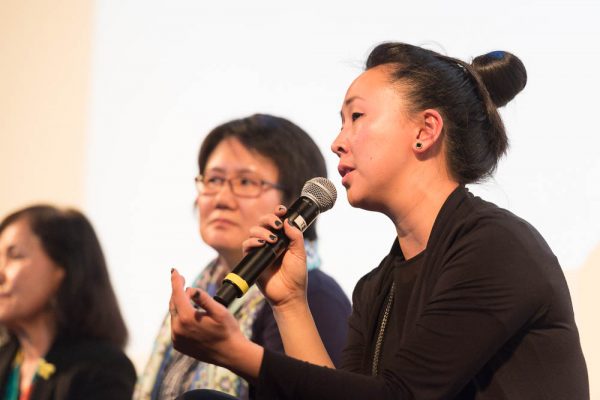More than 350 people filled the Lory Student Center Theatre on April 21, 2017, closing night of the ACT Human Rights Film Festival. They came to watch I Am Not Your Negro and to converse with Harry Belafonte.
That singular recipe – watch a film and then talk about it as a group – is the backbone of what makes ACT a transformative event, says Dr. Greg Dickinson, Department of Communication Studies chair and ACT producer. Add a living icon such as Harry Belafonte to the closing night guest line-up, and that transformation can become all the more powerful.
“I Am Not Your Negro is one of the most important documentaries on race in America,” Dickinson says. The Oscar-nominated film explores race in America using the words of James Baldwin to connect the history of the civil rights movement to the present. “We thought if we can sell out the house it would be a victory for the festival to host a conversation on one of the most difficult topics in our country.”
Lindsey Nielsen, ACT Programming Coordinator, first got the idea to invite Harry Belafonte after reading a review of I Am Not Your Negro which mentioned the 1963 March on Washington and the famous roundtable discussion on civil rights with James Baldwin, Harry Belafonte, Marlon Brando, Charlton Heston, Joseph Minklelwitz, and Sidney Portier.
“I could think of no better person to speak after the film,” Nielsen recalls.
Known primarily as a musician and actor, Belafonte spent his life challenging and overturning racial barriers across the globe. He played a key role in the civil rights movement, helped organize the Grammy-winning song “We Are the World,” and worked to help end apartheid in South Africa. He recently founded the Sankofa Justice & Equity Fund, a nonprofit social justice organization that utilizes the power of culture and celebrity in partnership with activism, and was honored with the Jean Hersholt Humanitarian Award from the Academy of Motion Picture Arts and Sciences in November 2014.
On closing night, Dr. Ray Black, assistant professor of Ethnic Studies, introduced Belafonte before the film started as “our distinguished guest.” Once the film concluded, Belafonte and Black took the stage for an intimate conversation.
“The conflict of race in this country has existed as long as there has been race in this country,” Belafonte first said to the audience. “What people must do to make a difference is harness the instruments of radical thought.”
Radical thought, he said, was presented in I Am Not Your Negro, and exists singularly within each person.
Radical thought and modern-day storytelling
In its second year, the ACT Human Rights Film Festival grew festival attendance by more than 70 percent, while keeping true to its mission to curate the best of the most recently made human rights cinema not available in wide release and honor the most relevant and compelling stories from around the world.
Over the span of the festival’s eight days, more than 1,700 people attended a total of 16 international films that featured stories of immigration, exile, women’s rights, war, memory, LGBTQ rights, the right to education, and freedom of expression. Six films made their Colorado debut. More than half were directed by women.

In all, 21 countries were represented, including Mali, Bosnia and Herzegovina, Japan, Cuba, Ireland, Zimbabwe, Mexico, and Iran. More than 20 guests participated in the Q&A sessions that follow each film; 14 of these were directors or subjects of the films screened.
Whether discussing the lives of Asian “comfort women” trafficked as sex slaves during World War II, exploring the dynamics of ethical filmmaking, or elaborating on a story’s evolution, audiences and Q&A guests did what for millennia humans have gathered to do: tell stories and discuss the nature of humanness.
“ACT is a continuation of this ancient tradition,” says Dickinson, citing rhetoric scholar Walter Fisher who writes ‘In the beginning was the word, or more accurately, the logos. And in the beginning logos meant story, reason, rationale, conception, discourse, and/or thought.’
Dickinson says the stories of the films screened during the festival can help map our worlds with images, words, and sounds. “They help us make sense of our daily lives,” he says. “And they offer visions of our humanity that engage with and resist dominant ways of knowing.”
The words of Rory O’Neill, creator of Panti Bliss and star of ACT’s opening night film, The Queen of Ireland, echo this idea. “The power of the personal story is what will change the world,” O’Neill told audiences during the film’s Q&A with him and director Conor Horgan.
The audience conversations spurred by the films during post-screening Q&A sessions explore what Dickinson calls “the values and actions necessary for human flourishing.”
“Face-to-face dialog helps chip away at prejudice and shape those engaged in the conversation,” Dickinson says. “Hope resides in the study of our past and our ancestors, in exploring the ways we gather and disintegrate. We witness this during each film festival Q&A.”
During the Q&A, filmmakers, film subjects, and local experts add context and insight to each film. These moments of conversation capture radical thought and reveal a desire we have as humans to make sense of this world, if not change it.
“As we left the student center long after the movie ended, we passed a group of faculty and students still sitting on the stairs, engaged in an intense conversation,” said Director of Presidential and Administrative Communications Cara Neth. “The climate of the ACT festival inspires this rare kind of engagement — the movies, the ideas, and the conversation around them left people with a lot to discuss and process.”
Learn more
ACT livestreamed the majority of this year’s Q&A sessions. They are available for viewing on the festival’s Facebook page.
See photos from the 2017 ACT Human Rights Film Festival on the CSU Flickr site.
Follow ACT Human Rights Film Festival on Facebook, Twitter, and Instagram.
